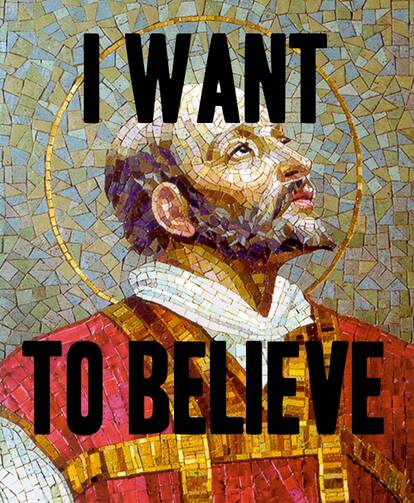For the last month I’ve found myself deep down the rabbit hole of Netflix Instant Streaming. My addiction du jour has been that classic 1990s sci fi conspiracy thriller, “The X-Files”. I don’t know when was the last time you took a look, but—perhaps from too much time spent watching it!—I’ve started to notice a funny similarity between one of its protagonist, Fox “I Want to Believe” Mulder and Saint Ignatius of Loyola.
It has something to do with wonder. One of the surprises in rewatching “The X-Files” is how few episodes are actually about alien conspiracies. It factors in just six of the twenty four episodes in the first season, and maybe eight in the season after that. Most weeks, “X-Files” was instead a monster of the week show, with Mulder and partner Dana Scully exploring the wild and the wooly and the strange and the secret of our planet. And while they always had a case to solve, much of the time Mulder seems far more interested in the acts of discovery and witness, in seeing the world exactly as it was, regardless of its believability.
The main tag line for the show was the classic “The Truth is Out There” but the corollary that’s really at its heart is, “...And we should know it, whatever it may be.”
There are any number of ways that I could try and jam the life of Saint Ignatius into that idea; something about how he, too, wanted to know the truth comes to mind. But that way of thinking seems too modern. Certainly, any time Ignatius was challenged about the work he was doing, he wanted authorities to examine its every aspect, to see it fully and to judge based on that. But that’s probably as far as one should take Ignatius and “the truth.”
No, it’s rather the “out there” part that I think of this Ignatius Day. One of the famous stories of Ignatius is that as an older man stuck running the Society in Rome, he used to look out at the stars at night. And if I remember correctly it gave him so much joy that it moved him to tears, to look up into that brilliant night sky.
There are probably lots of good explanations as to what was going on inside of him when he looked up, but I have to think at least part of it was a sense of wonder and perspective. If you’ve ever been to a place with little ambient light, you’ve almost certainly had that giddy experience of the night sky awash with so many lights you can’t quite believe it’s real. It’s beautiful, but also incredibly humbling; our own place in the universe is revealed to be so very small.
And yet that’s not a woeful experience. In fact, I always find it fills me with great relief. The universe is so much more than the traps, the little boxes that I set for myself.
That’s the Fox Mulder insight, I think, and the Ignatian one – to be open to the world in all its giddy majesty and unexpected strangeness. To allow ourselves to be challenged and surprised, our minds and hearts be expanded by what is truly out there, rather than rocked to sleep once again by all the safe fictions we murmur to ourselves.
There are so many things to admire when it comes to Ignatius. But this year, my mind admittedly (and enthusiastically) addled by endless hours of aliens and psychics and ghosts and Bigfoots, I find myself more aware than ever of his capacity for wonder and delight.
And that is certainly something in which I, too, want to believe.








